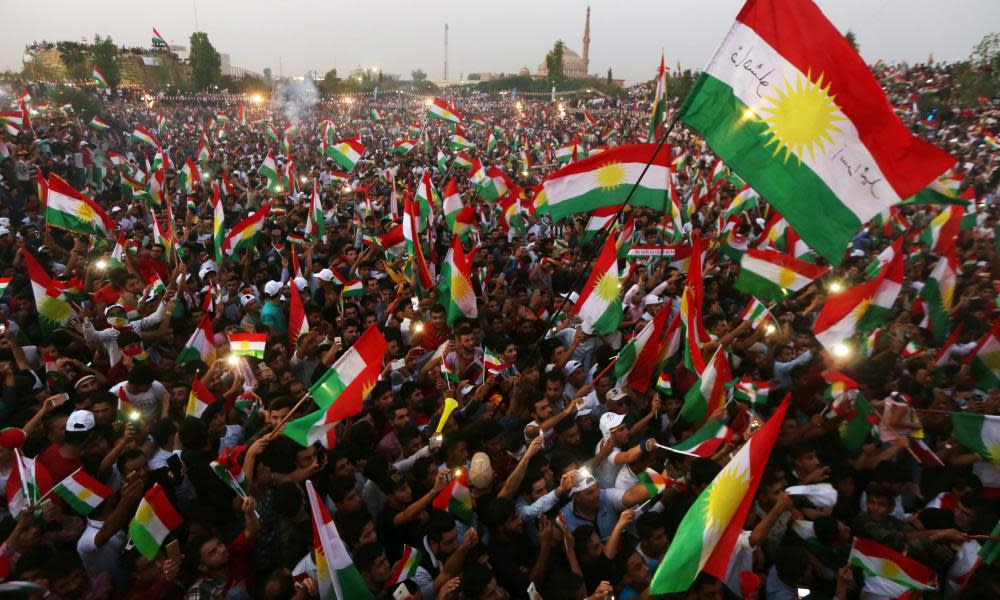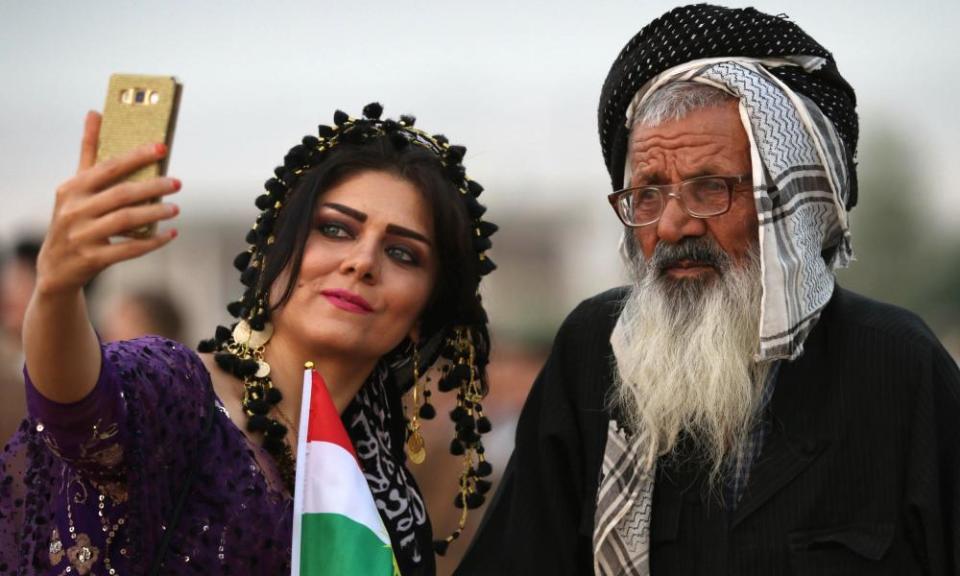Barzani on the Kurdish referendum: 'We refuse to be subordinates'

Iraq’s Kurdish leader, Masoud Barzani, is on the edge of defying overwhelming international opposition to take the Kurds to a landmark referendum he says will end the region’s role in a broken, sectarian Iraq, and pave the way to independence.
Speaking days before the ballot, scheduled for Monday, Barzani said the majority of the global community had underestimated the determination of the Kurds. It had also, he claimed, made a miscalculation in believing that his intention to hold the ballot was a “pressure card” designed to draw concessions, rather than a tangible first step towards a long-held goal of sovereignty.
“From world war one until now, we are not a part of Iraq,” he said. “It’s a theocratic, sectarian state. We have our geography, land and culture. We have our own language. We refuse to be subordinates.
“The parliament in Baghdad is not a federal parliament. It’s a chauvinistic, sectarian parliament. Trust is below zero with Baghdad,’ Barzani said at his presidential palace in the mountains beyond Erbil – the ruined city of Mosul 50 miles away, a border with Iran to the east, and Syria and Turkey to the west.

The language coming from Baghdad in the south has been equally forceful, predicting violence if the referendum goes ahead. And Haider al-Abadi, the Iraqi prime minister, says that if that happens, military intervention will follow.
Barzani, a slight figure walking with a sway and invariably clad in the studied simplicity of khaki, has led the Kurds of Iraq for 12 years, the last two as a de facto president of the semi-autonomous Kurdish region in the north of post-Saddam Iraq. His burden, and his cause, throughout a lifetime as a revolutionary, then statesman, has been to transform aspirations into sovereignty. Ranged against him – for now at least – is the rest of Iraq, the US, Iran, Turkey, Saudi Arabia, the UK, France, the European Union and the Arab League. In favour is Israel, a declaration he could probably have done without.
The vitriol between Baghdad and Erbil has a real manifestation on the ground. As part of the post-Iraq war settlement, the Kurdistan region was guaranteed annual injections of money from central funds, but that agreement collapsed amid a row over oil receipts.
Now, at first sight, there is a mass of construction work in and around the city, which is home to 850,000 people. Up close, the view is different: stalled construction, immobile cranes, the skeletons of half-finished skyscrapers sending out the message: no money. A debt of at least $20bn (£14.7bn) and fickle revenue stream add little comfort.
Along streets festooned with independence flags, past cars bearing posters and the ubiquitous image of Barzani, through three reinforced barriers, and three sets of armed guards, the Guardian is shown into Barzani’s conference room, ushered into the same seats occupied in recent weeks by the US defence secretary, James Mattis, and secretary of state, Rex Tillerson, and General Qassem Suleimani of Iran - and by the UK defence secretary, Michael Fallon, only 24 hours before. All of them told him: don’t do it.

But for 71-year-old Barzani, who has led the Kurdistan Democratic Party since 1979, having succeeded his father, it may be now or never.
Barzani has been fired by a sense of purpose ever since he joined the Peshmerga at the age of 16: “There are so many of us who have fallen and given their souls for this fight.”
Now, with the anticipated fall of Isis, he has another card to play.
“In 2015 I told President [Barack] Obama ... that the partnership with Iraq had failed. At the time we agreed to concentrate on the fight against Isis, so we left it at that.
“Is it a crime to ask our people to express themselves over what they want for the future?” asked Barzani. “It was surprising to see the reaction from the international community. Where is your democracy now? Where are the UN charters? Where is the respect for freedom of expression? After the big sacrifice of the Peshmerga and breaking the myth of Isis, we thought they would respect this right.”
Barzani appeared rattled by the intensity and volume of the opposition to the ballot. On Thursday, Washington released the latest of three increasingly strident statements condemning the poll. Iran and Turkey fear for regional stability and for how an almost certain win in Iraq would galvanise Kurdish minorities in their own countries, as well as Syria.
The multi-ethnic city of Kirkuk, which has been fought over by Kurds, Arabs and Turkmen throughout the ages, and controlled by the Kurdistan regional government for the past three years, has been included in the referendum. The move led Suleimani and Hadi al-Amiri, the leader of Iraq’s Shia militia, to threaten military force to retake the city.
The Iraqi government continues with its message that the referendum is in breach of the constitution and a potential trigger for the breakdown of the country, which was declared independent in 1932 when the post-Ottoman British mandate officially ended. To that charge, Barzani argued Iraq was a consequence of the Sykes-Picot document of 1916, a secret British-French carve-up which delineated borders: “The work of officials with a pencil and map.”
Barzani said he had been given no reason to change his mind, or the date, insisting that all offers put to him had centred on reverting to negotiations with Baghdad, which have repeatedly failed in the 14 years since the ousting of Saddam Hussein.
He said the referendum was a means to an end “but not the end itself”, and that post-referendum negotiations with Baghdad and regional partners could start within the next two years.
Asked what would be required for a postponement, Barzani said it would only be the offer of a UN mandated solution, with a prescribed agenda and timeline.
“Why would we enter into an open agenda, not knowing the alternative? We are not going to do that. It would need a real agenda, with a specific timeframe and the supervision of Unami [UN assistance mission in Iraq].
“Baghdad must come forward with a concept on how we can negotiate, being two good neighbours, within a timeframe.”

The referendum ballot asks: “Do you want the Kurdistan region and the Kurdistani areas outside the region’s administration to become an independent state?”
It sets no pathway towards sovereignty and has no administrative mechanism for any immediate changes to dealings between Baghdad and Erbil.
Attempting to allay fears that the referendum would set a dangerous precedent by creating a de-facto partition of Iraq along ethnic lines, Barzani said: “This would be a nation state, not built on one ethnic group. It would be based on citizenship.”
And with that the president is off: there are more rallies to address, more envoys to confront.
There was a last-minute boost: an appearance in Sulaimaniya alongside Hero Ibrahim Ahmed, the wife of Jalal Talabani, the stricken leader of the Patriotic Union of Kurdistan, the second clan-based party in the Kurdish north, which, after some ambivalence, has fallen in behind the referendum. The appearance offers a rare moment of unity before the ballot.
But there are dark warnings from some long-time observers of the Kurds’ struggle towards statehood. “They want to become a second Israel,” said one. “But they could become a second Palestine.”

 Yahoo News
Yahoo News 
